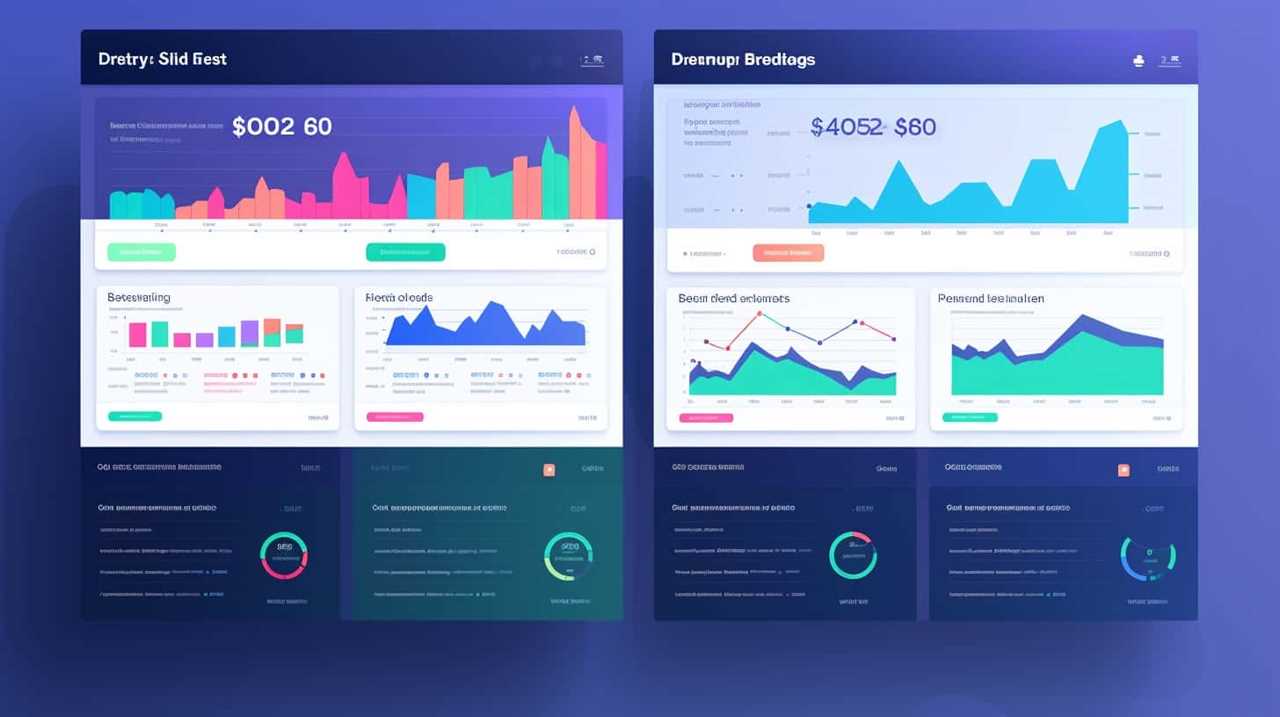Keyword Research
Topical Authority in Niche Markets: The Ultimate Guide

Looking to become the leading authority in your particular field? Search no further!
In this ultimate guide, we’ll show you how to achieve Topical Authority and dominate your industry.
From identifying your niche market to creating valuable content, optimizing your website, and building a strong social media presence, we’ve got you covered.
Get ready to engage with your target audience, collaborate with influencers, and measure your success.

Get ready to become the go-to expert in your field.
Let’s get started!
Key Takeaways
- Consistently creating high-quality, relevant content establishes topical authority and attracts organic traffic.
- Understanding your target audience and identifying market gaps and opportunities within your niche helps tailor your content and marketing strategies to reach the right people.
- Conducting in-depth market research and analyzing competitors allows you to identify strengths, weaknesses, and areas for improvement in order to stay ahead of the competition.
- Building a strong social media presence, engaging with your target audience, and collaborating with influencers and industry experts can enhance your brand authority and reach in niche markets.
Understanding Topical Authority
To fully grasp the concept of topical authority, it’s essential that we understand how it’s established and recognized by search engines. Understanding topical authority is the key to building expertise and becoming a thought leader in your niche market.
When you have topical authority, search engines recognize you as a trusted source of information in a specific field or topic. This recognition comes from consistently creating high-quality, relevant content that’s backed by your expertise and knowledge.

By establishing topical authority, you gain several benefits. Firstly, you become a go-to resource for your audience, attracting more organic traffic to your website. Secondly, you have a higher chance of ranking higher in search engine results, increasing your visibility and credibility. Finally, becoming a thought leader positions you as an industry expert, opening doors for collaborations, partnerships, and speaking opportunities.
Understanding topical authority is crucial for anyone looking to build expertise and become a thought leader in their niche market.
Identifying Your Niche Market
When it comes to identifying your niche market, there are a few key points to consider.
First, you need to understand your target audience and their demographics, as this will help you tailor your content and marketing strategies accordingly.

Second, it’s important to identify the market gap and opportunities within your niche, allowing you to position yourself as a unique and valuable solution.
Target Audience and Demographics
In our guide to topical authority in niche markets, we’ll explore the first crucial step in identifying your niche market: understanding the demographics and target audience. This step is essential because it allows you to tailor your content and marketing strategies to reach the right people.
Here are three key reasons why target audience segmentation and demographic analysis are vital:
- Precision targeting: By identifying your target audience, you can create content that speaks directly to their needs, preferences, and pain points.
- Efficient resource allocation: Understanding your target audience helps you allocate your resources wisely, focusing on the channels and platforms where your audience is most active.
- Increased conversion rates: When you know exactly who your target audience is, you can craft compelling messages and offers that resonate with them, increasing the likelihood of conversions.
Market Gap and Opportunities
Identifying a niche market requires a thorough analysis of the market gap and opportunities available. Conducting a comprehensive market analysis is crucial to understand the needs and preferences of your target audience. By examining the existing market, you can identify gaps where a particular product or service is lacking or where there’s room for improvement.

This analysis provides valuable insights into the potential opportunities that exist within your niche market. Once you have identified these gaps and opportunities, you can strategically plan your product development to meet the specific needs of your target audience. This approach allows you to differentiate yourself from competitors and position your brand as a leader in your niche market.
Conducting In-Depth Market Research
Now that we’ve identified our niche market, it’s time to conduct in-depth market research to gain a deeper understanding of our target audience.
This involves analyzing our target audience’s preferences, needs, and behaviors through target audience analysis.
Additionally, we need to employ competitor analysis techniques to identify our competitors’ strengths and weaknesses.

Lastly, gathering consumer insights will help us uncover valuable information about our target audience’s motivations and pain points, allowing us to tailor our marketing strategies accordingly.
Target Audience Analysis
As we delve into the realm of topical authority in niche markets, it becomes crucial for us to conduct in-depth market research to analyze our target audience. Understanding our audience is the key to creating content that resonates with them and establishes our authority in the niche market.
Here are three essential steps to effectively analyze our target audience:
- Target Audience Segmentation: Segmenting our audience allows us to group individuals with similar characteristics and preferences. By identifying different segments within our target audience, we can tailor our marketing efforts to meet their specific needs and interests.
- Customer Profiling: Creating detailed customer profiles helps us gain a deeper understanding of our target audience. We gather demographic information, such as age, gender, and location, as well as psychographic data, including interests, values, and motivations. This information enables us to craft personalized content that speaks directly to our audience’s desires and pain points.
- Market Research: Conducting thorough market research involves analyzing industry trends, competitor strategies, and customer behavior. We gather data through surveys, interviews, and analyzing online platforms. By staying informed about our market, we can identify opportunities for growth and develop strategies that set us apart from our competitors.
Competitor Analysis Techniques
To effectively conduct in-depth market research and gain a competitive edge, we employ various competitor analysis techniques. One of the most commonly used methods is conducting a SWOT analysis, which involves identifying the strengths, weaknesses, opportunities, and threats of our competitors.

By understanding their strengths, we can learn from their successful strategies and incorporate them into our own approach. Similarly, by identifying their weaknesses and the threats they face, we can capitalize on those areas and position ourselves as the better alternative.
Another technique we use is competitor benchmarking, where we compare our performance against our competitors in key areas such as pricing, product features, and customer service. This allows us to identify areas where we excel and areas that require improvement.
By implementing these techniques, we can stay ahead of the competition and continuously improve our offerings.
Now, let’s delve into the next section about gathering consumer insights.

Gathering Consumer Insights
In conducting in-depth market research, we gather consumer insights to gain a deeper understanding of our target audience and their preferences. This allows us to make informed decisions and develop strategies that resonate with our customers.
To gather these insights, we employ various techniques and tools. Here are three effective methods to consider:
- Surveys and Questionnaires: By conducting surveys and questionnaires, we can directly ask consumers about their preferences, buying behavior, and satisfaction levels. This provides valuable quantitative data that can help us identify trends and patterns.
- Interviews and Focus Groups: By engaging in one-on-one interviews or focus groups, we can gain qualitative insights into consumer behavior. These conversations allow us to delve deeper into their motivations, desires, and pain points, providing valuable context and understanding.
- Social Media Listening: Monitoring social media platforms allows us to observe conversations and trends surrounding our target audience. By analyzing social media posts and discussions, we can uncover valuable insights about consumer behavior and market trends.
Creating Valuable and Relevant Content
Our team has found that three key strategies for creating valuable and relevant content in niche markets are research, engagement, and storytelling.
When it comes to content creation strategies, thorough research is crucial. By understanding the needs, preferences, and pain points of your target audience, you can tailor your content to address their specific interests. This won’t only establish your authority in the niche but also attract and retain your ideal customers.

Additionally, engagement is essential for building a loyal community around your content. Encourage comments, questions, and discussions to foster a sense of connection and collaboration.
Lastly, storytelling is a powerful tool for capturing the attention and emotions of your audience. Craft compelling narratives that resonate with their experiences, and you’ll create content that’s memorable and impactful.
Optimizing Your Website for Topical Authority
We implement strategic techniques to optimize our website for topical authority in niche markets. To ensure that our website is optimized for topical authority, we focus on website design and keyword optimization.
Here are three key steps we take to optimize our website:

- Conduct thorough keyword research: We identify relevant keywords and phrases that align with our niche market. By incorporating these keywords into our website content, meta tags, and URLs, we increase our chances of ranking higher in search engine results.
- Optimize website structure and navigation: We organize our website in a logical and user-friendly manner. This includes creating a clear and intuitive navigation menu, using descriptive headings, and optimizing our URL structure. A well-structured website enhances the user experience and makes it easier for search engines to crawl and index our content.
- Improve page loading speed: We understand the importance of a fast-loading website. Slow-loading pages can negatively impact user experience and search engine rankings. To optimize our website’s loading speed, we optimize image sizes, minify code, and leverage browser caching. By ensuring our website loads quickly, we enhance user satisfaction and increase the likelihood of visitors engaging with our content.
Building a Strong Social Media Presence
To establish a strong social media presence, we utilize various strategies and techniques.
One of the most effective methods is influencer marketing. By partnering with influencers in your niche, you can tap into their existing audience and leverage their credibility to build trust and increase brand visibility. This can be done through sponsored posts, collaborations, or affiliate marketing.
Another crucial aspect is having a well-defined social media strategy. This involves setting clear goals, identifying your target audience, and creating engaging content that resonates with them. It’s important to choose the right platforms for your niche and consistently post high-quality content that adds value to your audience.
Additionally, engaging with your followers, responding to comments, and participating in relevant discussions will help you establish a strong online presence and foster a loyal community.

Engaging With Your Target Audience
When engaging with your target audience, it’s important to actively listen and respond to their needs and preferences. To effectively build brand loyalty and establish a strong connection with your audience, consider the following strategies:
- Personalize your communication: Tailor your messages and content to resonate with your audience’s interests and values. This shows that you understand and care about their specific needs.
- Encourage two-way communication: Create opportunities for your audience to engage with you, such as through comments, surveys, or live Q&A sessions. This fosters a sense of community and allows you to gather valuable feedback.
- Provide exceptional customer service: Show your audience that you value their satisfaction by promptly addressing their inquiries, concerns, or issues. This builds trust and loyalty.
By implementing these effective communication strategies, you can strengthen your relationship with your target audience and create a loyal customer base.
Now, let’s explore how collaborating with influencers and industry experts can further enhance your brand’s authority and reach.
Collaborating With Influencers and Industry Experts
Collaboration with influencers and industry experts amplifies brand authority and extends reach.

In today’s digital landscape, influencer partnerships and expert collaborations have become essential strategies for businesses aiming to establish topical authority in niche markets. By aligning with influencers who have a strong presence and credibility in your industry, you can tap into their established audience and gain exposure to a wider demographic. These partnerships not only increase brand visibility but also build trust and credibility among your target audience.
Similarly, collaborating with industry experts allows you to leverage their knowledge and expertise, positioning your brand as a trusted source of information. By associating your brand with respected individuals in your field, you can establish yourself as an authority and attract a highly engaged audience.
Tracking and Measuring Your Topical Authority Success
We will explore how to effectively track and measure the success of your topical authority in niche markets. Measuring success and tracking progress are essential for understanding the impact of your efforts and making data-driven decisions.
Here are three key strategies to help you track and measure your topical authority success:

- Set specific goals: Define what success means to you and set clear, achievable goals. This could be increasing website traffic, improving search engine rankings, or gaining more social media followers.
- Use analytics tools: Utilize tools like Google Analytics to track key metrics such as website traffic, page views, bounce rate, and conversion rates. This data will provide insights into the effectiveness of your content and help you identify areas for improvement.
- Monitor social media engagement: Keep an eye on your social media platforms to see how your audience is engaging with your content. Look at metrics such as likes, comments, shares, and click-through rates to gauge the impact and resonance of your topical authority.
Frequently Asked Questions
How Do I Choose the Right Niche Market for My Business?
When choosing profitable niches for our business, we focus on finding niche markets with high demand and low competition. It’s crucial to thoroughly research and analyze market trends to ensure success.
What Are Some Effective Strategies for Conducting Market Research in a Niche Market?
When conducting market research in a niche market, we find effective techniques include analyzing the target audience and their needs, conducting surveys and interviews, and studying competitors. These strategies help us gain valuable insights and stay ahead of the competition.
How Can I Ensure That the Content I Create Is Both Valuable and Relevant to My Target Audience?
To ensure our content is valuable and relevant to our audience, we engage in target audience analysis. By understanding their needs, interests, and preferences, we create engaging content that resonates with them.
What Are Some Key Elements to Consider When Optimizing My Website for Topical Authority?
When optimizing our website for topical authority, we need to consider key elements that will make our content valuable and relevant to our target audience. Website optimization is crucial for establishing expertise and attracting the right audience.

How Can I Effectively Track and Measure the Success of My Topical Authority Efforts?
To effectively track and measure the success of our topical authority efforts, we utilize various tracking metrics such as website traffic, keyword rankings, and engagement rates. This allows us to gauge our progress and make strategic adjustments.
Conclusion
In the vast landscape of niche markets, establishing topical authority is key to standing out and becoming a trusted resource. By conducting thorough market research, creating valuable content, optimizing your website, and building a strong social media presence, you can position yourself as an expert in your field.
Engaging with your target audience, collaborating with influencers, and tracking your success will further solidify your position. Like a beacon guiding ships through a stormy sea, your topical authority will attract and captivate your audience, setting you apart from the competition.
Keyword Research
How to Do Keyword Research on Semrush

Are you prepared to become an expert in keyword research using Semrush? We’ve got all the resources you need!
In this article, we’ll guide you through the process of setting up your Semrush account.
We’ll also help you understand its powerful keyword research features and how to conduct initial research.
Additionally, we’ll show you how to analyze keyword metrics and competition, refine your keyword list, and implement your findings.

Get ready to take your SEO strategy to the next level with Semrush!
Key Takeaways
- Sign up for a Semrush account and set up your website details
- Connect your Google Analytics and Google Search Console accounts to Semrush
- Utilize Semrush’s keyword research tools for content optimization and focus on long tail keywords
- Analyze competitors’ keyword strategies to refine your own approach and gain a competitive edge
Setting up Your Semrush Account
First, we’ll guide you through the process of setting up our Semrush account.
When exploring Semrush’s account management features, it’s crucial to understand how to maximize the benefits of its keyword tracking capabilities.
Setting up your Semrush account is a straightforward process. After signing up, you’ll be prompted to enter your website’s details and connect your Google Analytics and Google Search Console accounts. This allows Semrush to gather data about your website’s performance and keywords.

Once you’ve completed these steps, you can start exploring Semrush’s account management features, such as tracking your organic search positions, monitoring your competitors, and analyzing your website’s overall visibility.
Understanding Semrush’s account management features will lay the foundation for effectively utilizing its keyword tracking capabilities in the subsequent section about ‘Understanding Semrush’s Keyword Research Features’.
Understanding Semrush’s Keyword Research Features
Continuing our exploration of Semrush’s account management features, let’s delve into understanding Semrush’s keyword research capabilities.
When it comes to optimizing your content for search engines, Semrush’s keyword research tools are invaluable. Here are three key features to help you make the most of your keyword research:

- Content optimization: Semrush’s keyword research tools provide insights into the keywords your target audience is searching for. This allows you to optimize your content to align with their search intent and increase your chances of ranking higher in search engine results pages.
- Long tail keywords: Semrush’s keyword research emphasizes the importance of long tail keywords. These longer and more specific phrases have lower competition and higher conversion rates, making them a crucial element in your SEO strategy.
- Competitor analysis: Semrush’s keyword research allows you to analyze your competitors’ keyword strategies. By identifying the keywords they’re targeting, you can gain valuable insights and refine your own keyword strategy to outperform them.
Understanding and leveraging Semrush’s keyword research tools will give you a competitive edge in optimizing your content and driving organic traffic to your website.
Conducting Initial Keyword Research
Now, let’s delve into how we can conduct our initial keyword research on Semrush.
When it comes to finding relevant keywords, there are a few effective strategies we can employ. One of them is focusing on long tail keywords, which are more specific and have lower competition. By targeting these keywords, we can attract highly targeted traffic to our website.
Additionally, utilizing competitor analysis for keyword research can provide valuable insights into the keywords that are driving traffic to our competitors’ websites. This information can help us identify untapped opportunities and optimize our own content.

By employing these strategies, we can lay the foundation for a successful keyword research campaign.
In the next section, we’ll discuss how to analyze keyword metrics and competition to further refine our keyword selection and strategy.
Analyzing Keyword Metrics and Competition
To further refine our keyword selection and strategy, we can analyze keyword metrics and competition on Semrush. This step is crucial in choosing the right keywords for your SEO strategy.
By analyzing keyword difficulty and search volume, we can better target our audience and increase our chances of ranking higher in search engine results.

Here are three key factors to consider when analyzing keyword metrics and competition:
- Keyword Difficulty: This metric helps us understand how challenging it will be to rank for a specific keyword. A higher difficulty score indicates stronger competition, while a lower score suggests a better chance of ranking.
- Search Volume: This metric shows how many people are searching for a particular keyword. It helps us identify popular keywords with a higher potential for driving traffic to our website.
- Competitor Analysis: By examining the competition for our chosen keywords, we can gain insights into their strategies, strengths, and weaknesses. This information allows us to refine our own approach and find gaps in the market.
Analyzing these metrics and competition will help us make informed decisions about the keywords to target, ultimately improving our SEO strategy.
Refining Your Keyword List and Implementing Your Findings
After analyzing keyword metrics and competition on Semrush, we refine our keyword list and implement our findings.
Refining our keyword list involves removing irrelevant keywords and focusing on those with high potential for driving organic traffic. We also identify long-tail keywords, which have lower competition and higher conversion rates.

Implementing keyword optimization strategies is crucial for maximizing organic traffic growth. This includes incorporating targeted keywords into website content, meta tags, and URLs. It’s also important to optimize on-page elements such as headings, image alt tags, and internal links.
Additionally, monitoring keyword rankings and making necessary adjustments is essential for staying ahead of the competition.
Frequently Asked Questions
Can I Use Semrush for Keyword Research on Platforms Other Than Google?
Yes, you can use Semrush for keyword research on social media platforms and e-commerce platforms. It provides valuable insights and data to help you optimize your keyword strategy across different platforms.
How Often Should I Update My Keyword List?
We update our keyword list regularly to ensure we stay up to date with search trends and maximize the benefits of our research. The frequency of updating the keyword list depends on the dynamic nature of our industry.

Can I Track the Performance of My Keywords Over Time?
Yes, we can track the performance of our keywords over time. It is important to track keyword rankings to understand how our SEO efforts are impacting search visibility and to make informed optimization decisions.
Are There Any Alternative Tools to Semrush for Keyword Research?
There are several alternative keyword research tools available that can be used for keyword research. It is important to compare these tools and consider their pros and cons before making a decision.
How Can I Find Long-Tail Keywords Using Semrush?
Finding long-tail keywords on Semrush helps us unlock the benefits of using them in SEO. By optimizing our content with these specific keywords, we can attract targeted traffic and improve our search rankings. Here are some tips for optimizing content with long-tail keywords.
Conclusion
In conclusion, conducting keyword research on Semrush is crucial for optimizing your website’s visibility and driving organic traffic.

By setting up your account, exploring the platform’s features, and analyzing keyword metrics and competition, you can refine your keyword list and implement effective strategies.
Remember, success lies in finding the right keywords that resonate with your target audience and align with your business goals.
So, start your research journey on Semrush and unlock the potential for online success.
Keyword Research
How to Do Keyword Research With Google

In our pursuit of digital dominance, grasping the significance of keywords is crucial. These concise yet powerful words are essential for online achievement. So, what’s the optimal way to take advantage of this opportunity?
Fear not, for we have Google by our side. With its Keyword Planner, we can uncover valuable keyword ideas. And with Google Trends, we can analyze competition.
Together, let’s embark on a journey of keyword research using the tools at our disposal.
Key Takeaways
- Keyword research helps identify relevant and high-performing keywords for a website.
- Long tail keywords target specific niche markets and attract a focused audience.
- Google Keyword Planner provides comprehensive keyword suggestions based on search volume, competition, and relevance.
- Google Trends provides insights on search volume and keyword trends over time.
Understanding the Importance of Keyword Research
Keyword research is an essential step in our digital marketing strategy as it helps us identify the most relevant and high-performing keywords for our website.

One of the benefits of long tail keywords in keyword research is their ability to target specific niche markets. By including more specific and descriptive phrases in our content, we can attract a more focused audience that’s more likely to convert.
Additionally, long tail keywords often have less competition, making it easier for our website to rank higher in search engine results.
Another crucial aspect of keyword research is understanding keyword intent. By analyzing the intent behind a user’s search query, we can optimize our website and content to align with their needs and preferences.
This not only improves our search engine rankings but also increases the chances of attracting qualified traffic to our website.

Using Google Keyword Planner for Keyword Ideas
We frequently rely on Google Keyword Planner to generate a multitude of keyword ideas for our digital marketing strategy. Here’s why it’s our go-to tool:
- Comprehensive keyword suggestions:
Google Keyword Planner provides a vast array of keyword ideas based on search volume, competition, and relevance. This allows us to explore a wide range of options and identify the most effective keywords for our campaigns. - Comparison with other tools:
One of the key advantages of Google Keyword Planner is its ability to compare keyword data with other tools. This feature helps us gain valuable insights and make informed decisions when selecting the right keywords for our targeting. - Long tail keyword targeting:
Google Keyword Planner also helps us identify long tail keywords, which are specific and highly targeted phrases. Using long tail keywords allows us to reach a more niche audience, resulting in better conversion rates and higher ROI.
Analyzing Keyword Competition With Google Trends
To assess keyword competition, we turn to Google Trends for valuable insights and data-driven analysis. Google Trends allows us to analyze search volume and identify keyword trends over time.
By entering a keyword or a group of keywords into Google Trends, we can see how their popularity has changed over the years and even compare different keywords to see which one is more popular. This information helps us understand the level of competition for a particular keyword and make informed decisions in our keyword research.
Utilizing Google Search Console for Keyword Insights
By leveraging the insights provided by Google Trends, we can now delve into the benefits of utilizing Google Search Console for valuable keyword insights.

Here are three key reasons why Google Search Console is an essential tool for advanced keyword research techniques:
- Performance Data: Google Search Console provides detailed performance data for your website, including the keywords that are driving organic traffic. This data allows you to identify high-performing keywords and optimize your content accordingly.
- Search Queries: With Google Search Console, you can see the exact search queries that users are entering to find your website. This information helps you understand user intent and refine your keyword targeting.
- Click-Through Rate (CTR) Analysis: Google Search Console provides CTR data for your website’s organic search results. By analyzing your CTR for different keywords, you can identify opportunities to improve your meta tags and increase your organic click-through rate.
Best Practices for Conducting Keyword Research With Google
Now let’s explore the best practices for conducting keyword research with Google and how it can enhance our understanding of user intent and drive organic traffic to our website.
When it comes to keyword research strategies for small businesses, it’s important to start by identifying relevant keywords that align with your target audience and business goals. Use tools like Google Keyword Planner or other keyword research tools to find high-volume, low-competition keywords.
Once you have a list of keywords, incorporate them strategically into your website content. Tips for optimizing website content with targeted keywords include placing them in the page title, meta description, headings, and throughout the body of the content. Remember to write naturally and provide valuable information to the users.

Regularly analyze and update your keyword strategy to stay ahead of the competition and drive more organic traffic to your website.
Frequently Asked Questions
How Can I Use Keyword Research to Improve My Website’s Search Engine Rankings?
To improve our website’s search engine rankings, we can use keyword research to optimize our content and implement the findings for on-page SEO improvements. It’s crucial for mastering search engine optimization.
Are There Any Alternative Tools or Platforms I Can Use for Keyword Research Besides Google Keyword Planner?
There are several alternative keyword research tools and platforms available, which can provide additional benefits when used alongside Google Keyword Planner. Using multiple tools allows for comprehensive and thorough keyword research.
Can I Use Google Trends to Analyze the Competition for Long-Tail Keywords?
Using Google Trends for competitor analysis is a great way to find profitable long-tail keywords. It allows us to see the popularity and seasonality of keywords, helping us make data-driven decisions for our keyword research.

How Can I Leverage the Data From Google Search Console to Enhance My Keyword Research Strategy?
To optimize our keyword research strategy, we can leverage the data from Google Search Console. It provides valuable insights into search queries, impressions, and CTR, helping us identify high-performing keywords and improve our content.
Are There Any Common Mistakes to Avoid When Conducting Keyword Research Using Google?
When it comes to keyword research, we’ve all made mistakes. But fear not! We’ll show you how to avoid common pitfalls and master the art of keyword research. Let’s dive in!
Conclusion
In the vast forest of online content, keyword research acts as our compass, guiding us to the hidden treasures of search engine visibility. Just as explorers rely on maps to navigate uncharted territories, we rely on Google’s tools to uncover valuable keywords.
With the power of Google Keyword Planner, Google Trends, and Google Search Console, we can analyze competition, gain insights, and optimize our content for success.

So, let’s embark on this digital quest armed with knowledge and make our mark in the online realm.
Keyword Research
How to Do Keyword Research

The advantages of incorporating long-tail keywords into content marketing approaches.
Are you ready to unlock the secrets of successful keyword research? We’ve got you covered.
In this article, we’ll guide you through the process step by step, helping you uncover the most valuable keywords for your target audience.
From brainstorming ideas to analyzing competition, we’ll show you how to refine your keyword list for maximum impact.

Get ready to take your SEO strategy to the next level and dominate the search engine rankings.
Let’s dive in and master keyword research together.
Key Takeaways
- Keyword research helps understand the language and phrases used by the target audience.
- Focusing on long tail keywords attracts more qualified traffic.
- Local SEO allows targeting customers in specific geographical areas.
- Keyword research helps identify popular search terms.
Understanding the Importance of Keyword Research
Keyword research is crucial for our online success. It helps us understand the language and phrases our target audience uses when searching for information, products, or services online. Two important aspects of keyword research are the role of long tail keywords and the impact of local SEO.
Long tail keywords play a significant role in keyword research. These are longer, more specific phrases that are less competitive but highly targeted. By focusing on long tail keywords, we can attract more qualified traffic to our website, increasing the chances of conversion.

Local SEO also has a profound impact on keyword research. Optimizing our website for local search helps us target customers in specific geographical areas. It allows us to tailor our keywords to include location-specific terms, making it easier for local customers to find us.
Understanding the importance of long tail keywords and the impact of local SEO is essential for effective keyword research and ultimately, our online success.
Defining Your Target Audience and Goals
To effectively conduct keyword research, we must first define our target audience and establish our goals. Understanding your audience’s search intent is crucial in identifying the keywords they’re likely to use when searching online. This will help us create content that aligns with their needs and interests. Additionally, setting realistic goals is essential to measure the success of our keyword research efforts.
Here are four steps to help us define our target audience and goals:

- Conduct market research to identify our target audience’s demographics, interests, and online behavior.
- Analyze competitor websites and social media platforms to understand what keywords they’re targeting.
- Use tools like Google Analytics and social media analytics to gain insights into our audience’s search queries and engagement patterns.
- Clearly define our goals, whether it’s increasing website traffic, generating leads, or improving search engine rankings.
Generating Keyword Ideas
Now that we’ve defined our target audience and established our goals, let’s dive into generating keyword ideas.
Brainstorming techniques are a great way to come up with a wide range of keywords that could potentially attract our target audience. A brainstorming session can involve listing related terms, thinking about different aspects of our product or service, and considering the pain points or needs of our audience.
Additionally, conducting niche keyword research can help us identify specific keywords that are relevant to our industry or market segment. By focusing on these niche keywords, we can narrow down our keyword list to be more targeted and effective.
In the next section, we’ll discuss how to analyze keyword competition and volume, which will further refine our keyword selection process.

Analyzing Keyword Competition and Volume
Now, let’s delve into how we analyze the competition and volume of keywords to further refine our keyword selection process.
To effectively analyze keyword competition and volume, we follow these steps:
- Analyzing keyword trends: We examine the search trends of specific keywords to understand their popularity over time. This helps us identify which keywords are currently in demand and can guide our content creation strategy.
- Identifying high-value keywords: We look for keywords with a high search volume and low competition. These keywords have the potential to drive significant traffic to our website and attract more potential customers.
- Competitor analysis: We analyze the keywords that our competitors are targeting. This gives us insights into their keyword strategy and helps us identify opportunities to outperform them in search engine rankings.
- Keyword difficulty assessment: We evaluate the difficulty of ranking for specific keywords by considering factors such as domain authority, backlink profile, and content quality of the top-ranking pages. This helps us prioritize our keyword targeting efforts.
Refining Your Keyword List for Maximum Impact
After analyzing keyword competition and volume, we can now focus on refining our keyword list for maximum impact. Keyword optimization techniques are essential to ensure that our website ranks higher in search engine results and attracts relevant traffic.
One effective strategy is to use long tail keywords effectively. These are longer and more specific phrases that target niche audiences and have lower competition. By incorporating long tail keywords into our content, we can attract more qualified leads and increase conversion rates.

Additionally, refining our keyword list allows us to prioritize the most relevant and high-performing keywords. This helps us create targeted and compelling content that resonates with our audience and improves our overall SEO strategy.
Frequently Asked Questions
How Can I Determine the Search Volume and Competition for Specific Keywords?
To determine search volume and competition for specific keywords, we use search volume determination and competition analysis. It helps us understand the popularity and competitiveness of keywords, allowing us to make informed decisions for our keyword research strategy.
Are There Any Tools Available to Help With Keyword Research?
There are various tools available to assist with keyword research. These tools can provide valuable insights into search volume and competition, allowing us to optimize our content effectively. Using the best practices for keyword research is crucial for success.
How Do I Identify Long-Tail Keywords and Why Are They Important?
Identifying long-tail keywords is crucial for effective SEO. They are specific, less competitive, and have a higher conversion rate. Incorporating long-tail keywords in content marketing strategies improves search visibility and drives targeted traffic to your website.

Can I Use Competitor Analysis to Improve My Keyword Research?
Yes, competitor analysis can greatly enhance our keyword research. By analyzing our competitors, we can uncover untapped keyword opportunities and leverage their keyword data to create strategic and engaging content.
What Is the Significance of Local Keyword Targeting and How Can I Incorporate It Into My Research?
Local keyword targeting is crucial for optimizing our website for local search. Incorporating local SEO in keyword research helps us reach a targeted audience and improve our visibility in specific geographic areas.
Conclusion
In conclusion, conducting effective keyword research is crucial for achieving maximum impact in your online presence.
By understanding the importance of keyword research and defining your target audience and goals, you can generate relevant keyword ideas.

Analyzing keyword competition and volume helps you refine your keyword list strategically.
Remember, the key to success lies in finding the right keywords that resonate with your audience and drive organic traffic to your website.
So, stay strategic and start your keyword journey today!
-

 Expert Content Authority2 weeks ago
Expert Content Authority2 weeks agoThe Pillar of SEO: Why Content Consistency Matters Most
-

 Learning Center2 weeks ago
Learning Center2 weeks agoUncover How To Use ChatGPT to Write Effective Ad Copy
-

 Learning Center1 week ago
Learning Center1 week agoAI in 2024: 10 Things We are NOT Looking Forward To
-

 Holistic SEO3 weeks ago
Holistic SEO3 weeks agoHolistic Local SEO Tactics for Small Businesses
-

 Learning Center2 weeks ago
Learning Center2 weeks agoOptimize Your Digital Experience with Akamai CDN
-

 Learning Center3 weeks ago
Learning Center3 weeks agoExperience How GPT-4 Turbo Beats Claude 2: A Review
-

 Learning Center3 weeks ago
Learning Center3 weeks agoMastering SEO through the Google SGE Lens: A Comprehensive Guide
-

 Holistic SEO2 weeks ago
Holistic SEO2 weeks agoMaximize Engagement with YouTube Videos End Screens














